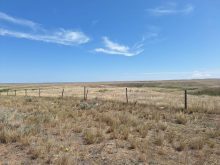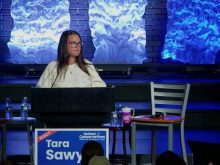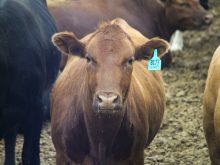The elimination of a non-refundable cattle checkoff in Alberta could cost Canada’s beef industry over $20 million a year in lost economic benefits, according to figures in a new study.
A national agency which directs checkoff money toward beef research, promotion and market development has slashed its annual budget, mainly because the Alberta checkoff, once mandatory, is now refundable.
The Canadian Beef Cattle Research, Market Development and Promotion Agency (also known as the NCO, or national checkoff, agency) is budgeting $5.6 million for 2011, down from over $8 million in 2010.
Read Also

Farming Smarter receives financial boost from Alberta government for potato research
Farming Smarter near Lethbridge got a boost to its research equipment, thanks to the Alberta government’s increase in funding for research associations.
The potential loss of Alberta checkoff dollars is responsible for almost $2 million in the NCO budget drop, agency chair Marlin Beever said.
Big impact
This will have a direct impact on the Beef Information Centre, the Canada Beef Export Federation and the Beef Research Council, which NCO funds with the checkoff money it receives from provinces, he said.
“It will cause some major concerns for our funding partners,” said Beever, a cattle producer from Rivers, Manitoba.
“I would think they would have to have some serious looks at their budgets. There simply will not be enough money to meet all the needs.”
An NCO study released last week found that every refunded Alberta checkoff dollar costs the beef industry $11 in economic benefits. Thus, a $2-million drop in NCO checkoff collections means a $22-million loss to the beef industry.
Each province collects a levy on cattle sold within its borders, with $1 automatically going to NCO. The agency distributes money proportionately to the three other agencies.
Supplementary funds
One dollar received by the NCO attracts another $6 in supplementary funding. Less checkoff money means less ability to obtain matching funds from other sources.
“Without that, we’re going to lose the ability to leverage. And that’s where the real lost opportunity comes in,” Beever said.
Most provinces have legislation requiring $1 of all checkoff money levied to go directly to NCO. But such legislation wasn’t seen as necessary in Alberta because the checkoff there was always nonrefundable.
That changed when the Alberta government made its checkoff refundable, effective April 1, 2010.
It’s not yet known how much the change will affect the amount of money collected. Producers may apply for refunds every six months.
Considerable loss
But the loss of national checkoff dollars could be considerable, since Alberta is by far Canada’s largest beef-producing province.
Alberta’s new agriculture minister, Jack Hayden has said he is amenable to locking in the $1 national contribution but has so far made no actual commitment to doing so.
The recent change in Alberta’s checkoff status could also affect Canada’s efforts to place a proposed levy on beef imports, said Beever.
The Canadian Cattlemen’s Association wants Ottawa to levy fresh beef (mainly from the U.S.) entering the country. The money would be used for beef research and promotion.
The U.S. has a similar levy on meat and live animal imports.
But Beever said all provinces must have non-refundable checkoffs for such an import levy to work. If one province opts out, an importer could demand a refund on the grounds that checkoffs are not universal across the country.
“If we have any province opt out – it doesn’t matter where there’s an opt-out provision – that would open the door for an importer to also opt out,” he said. “We need all the provinces in.”
Major dividends
The NCO study, authored by John Cranfield, a University of Guelph economist, says checkoffs deliver major dividends for Canada’s cattle producers.
It found that every checkoff dollar invested in national research and marketing activities between 2005 and 2008 earned back an average $9 in economic benefits.
Canada’s 9:1 rate of return is greater than for beef cattle checkoffs in Australia (5:1) and the U.S. (5.5:1), the study said.
But the loss of economic benefits for every Alberta checkoff dollar refunded (11:1) is higher than the benefits for every Canadian dollar spent (9:1), it said.














